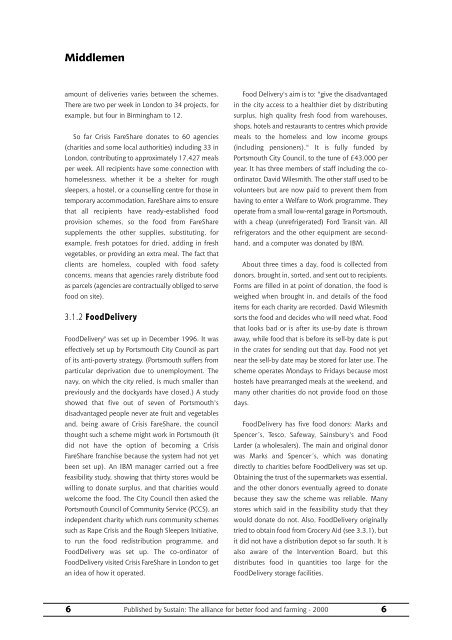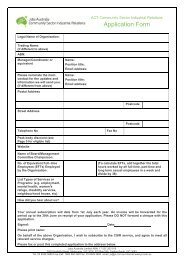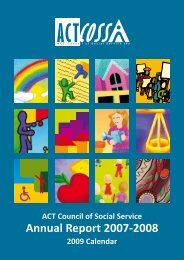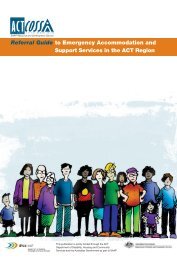Too much and too little? Debates on surplus food redistribution
Too much and too little? Debates on surplus food redistribution
Too much and too little? Debates on surplus food redistribution
Create successful ePaper yourself
Turn your PDF publications into a flip-book with our unique Google optimized e-Paper software.
Middlemen<br />
amount of deliveries varies between the schemes.<br />
There are two per week in L<strong>on</strong>d<strong>on</strong> to 34 projects, for<br />
example, but four in Birmingham to 12.<br />
So far Crisis FareShare d<strong>on</strong>ates to 60 agencies<br />
(charities <str<strong>on</strong>g>and</str<strong>on</strong>g> some local authorities) including 33 in<br />
L<strong>on</strong>d<strong>on</strong>, c<strong>on</strong>tributing to approximately 17,427 meals<br />
per week. All recipients have some c<strong>on</strong>necti<strong>on</strong> with<br />
homelessness, whether it be a shelter for rough<br />
sleepers, a hostel, or a counselling centre for those in<br />
temporary accommodati<strong>on</strong>. FareShare aims to ensure<br />
that all recipients have ready-established <strong>food</strong><br />
provisi<strong>on</strong> schemes, so the <strong>food</strong> from FareShare<br />
supplements the other supplies, substituting, for<br />
example, fresh potatoes for dried, adding in fresh<br />
vegetables, or providing an extra meal. The fact that<br />
clients are homeless, coupled with <strong>food</strong> safety<br />
c<strong>on</strong>cerns, means that agencies rarely distribute <strong>food</strong><br />
as parcels (agencies are c<strong>on</strong>tractually obliged to serve<br />
<strong>food</strong> <strong>on</strong> site).<br />
3.1.2 FoodDelivery<br />
FoodDelivery9 was set up in December 1996. It was<br />
effectively set up by Portsmouth City Council as part<br />
of its anti-poverty strategy. (Portsmouth suffers from<br />
particular deprivati<strong>on</strong> due to unemployment. The<br />
navy, <strong>on</strong> which the city relied, is <str<strong>on</strong>g>much</str<strong>on</strong>g> smaller than<br />
previously <str<strong>on</strong>g>and</str<strong>on</strong>g> the dockyards have closed.) A study<br />
showed that five out of seven of Portsmouth's<br />
disadvantaged people never ate fruit <str<strong>on</strong>g>and</str<strong>on</strong>g> vegetables<br />
<str<strong>on</strong>g>and</str<strong>on</strong>g>, being aware of Crisis FareShare, the council<br />
thought such a scheme might work in Portsmouth (it<br />
did not have the opti<strong>on</strong> of becoming a Crisis<br />
FareShare franchise because the system had not yet<br />
been set up). An IBM manager carried out a free<br />
feasibility study, showing that thirty stores would be<br />
willing to d<strong>on</strong>ate <strong>surplus</strong>, <str<strong>on</strong>g>and</str<strong>on</strong>g> that charities would<br />
welcome the <strong>food</strong>. The City Council then asked the<br />
Portsmouth Council of Community Service (PCCS), an<br />
independent charity which runs community schemes<br />
such as Rape Crisis <str<strong>on</strong>g>and</str<strong>on</strong>g> the Rough Sleepers Initiative,<br />
to run the <strong>food</strong> redistributi<strong>on</strong> programme, <str<strong>on</strong>g>and</str<strong>on</strong>g><br />
FoodDelivery was set up. The co-ordinator of<br />
FoodDelivery visited Crisis FareShare in L<strong>on</strong>d<strong>on</strong> to get<br />
an idea of how it operated.<br />
Food Delivery's aim is to: "give the disadvantaged<br />
in the city access to a healthier diet by distributing<br />
<strong>surplus</strong>, high quality fresh <strong>food</strong> from warehouses,<br />
shops, hotels <str<strong>on</strong>g>and</str<strong>on</strong>g> restaurants to centres which provide<br />
meals to the homeless <str<strong>on</strong>g>and</str<strong>on</strong>g> low income groups<br />
(including pensi<strong>on</strong>ers)." It is fully funded by<br />
Portsmouth City Council, to the tune of £43,000 per<br />
year. It has three members of staff including the coordinator,<br />
David Wilesmith. The other staff used to be<br />
volunteers but are now paid to prevent them from<br />
having to enter a Welfare to Work programme. They<br />
operate from a small low-rental garage in Portsmouth,<br />
with a cheap (unrefrigerated) Ford Transit van. All<br />
refrigerators <str<strong>on</strong>g>and</str<strong>on</strong>g> the other equipment are sec<strong>on</strong>dh<str<strong>on</strong>g>and</str<strong>on</strong>g>,<br />
<str<strong>on</strong>g>and</str<strong>on</strong>g> a computer was d<strong>on</strong>ated by IBM.<br />
About three times a day, <strong>food</strong> is collected from<br />
d<strong>on</strong>ors, brought in, sorted, <str<strong>on</strong>g>and</str<strong>on</strong>g> sent out to recipients.<br />
Forms are filled in at point of d<strong>on</strong>ati<strong>on</strong>, the <strong>food</strong> is<br />
weighed when brought in, <str<strong>on</strong>g>and</str<strong>on</strong>g> details of the <strong>food</strong><br />
items for each charity are recorded. David Wilesmith<br />
sorts the <strong>food</strong> <str<strong>on</strong>g>and</str<strong>on</strong>g> decides who will need what. Food<br />
that looks bad or is after its use-by date is thrown<br />
away, while <strong>food</strong> that is before its sell-by date is put<br />
in the crates for sending out that day. Food not yet<br />
near the sell-by date may be stored for later use. The<br />
scheme operates M<strong>on</strong>days to Fridays because most<br />
hostels have prearranged meals at the weekend, <str<strong>on</strong>g>and</str<strong>on</strong>g><br />
many other charities do not provide <strong>food</strong> <strong>on</strong> those<br />
days.<br />
FoodDelivery has five <strong>food</strong> d<strong>on</strong>ors: Marks <str<strong>on</strong>g>and</str<strong>on</strong>g><br />
Spencer’s, Tesco, Safeway, Sainsbury's <str<strong>on</strong>g>and</str<strong>on</strong>g> Food<br />
Larder (a wholesalers). The main <str<strong>on</strong>g>and</str<strong>on</strong>g> original d<strong>on</strong>or<br />
was Marks <str<strong>on</strong>g>and</str<strong>on</strong>g> Spencer’s, which was d<strong>on</strong>ating<br />
directly to charities before FoodDelivery was set up.<br />
Obtaining the trust of the supermarkets was essential,<br />
<str<strong>on</strong>g>and</str<strong>on</strong>g> the other d<strong>on</strong>ors eventually agreed to d<strong>on</strong>ate<br />
because they saw the scheme was reliable. Many<br />
stores which said in the feasibility study that they<br />
would d<strong>on</strong>ate do not. Also, FoodDelivery originally<br />
tried to obtain <strong>food</strong> from Grocery Aid (see 3.3.1), but<br />
it did not have a distributi<strong>on</strong> depot so far south. It is<br />
also aware of the Interventi<strong>on</strong> Board, but this<br />
distributes <strong>food</strong> in quantities <str<strong>on</strong>g>too</str<strong>on</strong>g> large for the<br />
FoodDelivery storage facilities.<br />
6 Published by Sustain: The alliance for better <strong>food</strong> <str<strong>on</strong>g>and</str<strong>on</strong>g> farming - 2000<br />
6













